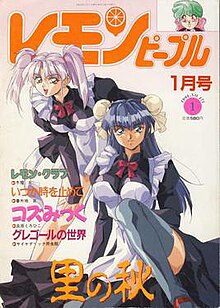 Cover of January 1994 issue. | |
| Categories | Lolicon, bishōjo, hentai |
|---|---|
| Frequency | Monthly |
| First issue | February 1982 |
| Final issue | November 1998 |
| Company | Amatriasha |
| Country | Japan |
| Language | Japanese |
Lemon People (レモンピープル, Remon Pīpuru) was an adult lolicon and bishōjo manga magazine published by Amatriasha from February 1982[1] to November 1998 in Japan. The first issue had some gravure idol photographs, but the format of the magazine quickly switched to all manga by the eighth issue.
Lemon People was one of the first lolicon magazines, with the first issue's cover stating that it "had the monopoly on lolicon comic content in 1982".[2] Lemon People was the longest-running lolicon manga magazine in Japan at the time, this record only being surpassed by Comic LO in the late 2010s. The magazine ran stories with genres that included science fiction, cyberpunk, space opera, fantasy, and horror. Other stories often involved humor and parody.[3] Lemon People received competition from other magazines such as Manga Burikko, Manga Hot Milk, Melon Comic, and Monthly Halflita, though none of them achieved the same success.
Before Lemon People, adult comics tended to be more dramatic and serious. Lemon People changed the genre by introducing a more cute style of manga, often with less realistic storylines. Lemon People was considered the beginning of the "new wave" of lolicon manga.[4] Throughout the 1980s and 1990s, there was a growing movement in Japan to censor magazines such as Lemon People because some viewed them as harmful to young people.
By the mid-1990s, the sales of Lemon People began to drop, and the magazine changed its format to the B5 paper size and reduced its cover price. However this strategy was not effective, and the November 1998 issue was the last one, ending a run of sixteen years and nine months.
- ^ Comic Box, Fusion Product, April 1983, p.178
- ^ Kimi, Rito (2021). The History of Hentai Manga: An Expressionist Examination of Eromanga. FAKKU. p. 26. ISBN 978-1-63442-253-6.
- ^ Attardo, Salvador, ed. (2014). Encyclopedia of Humor Studies. SAGE Publications. p. 475. ISBN 9781483364704.
- ^ Shinpo, Nobunaga [in Japanese], ed. (February 14, 2000). "すべてはエロから始まった" [It all started with erotica]. 消えたマンガ雑誌 [Vanished Manga Magazines] (in Japanese). Tokyo, Japan: Media Factory. pp. 30–37. ISBN 4-8401-0006-3.
